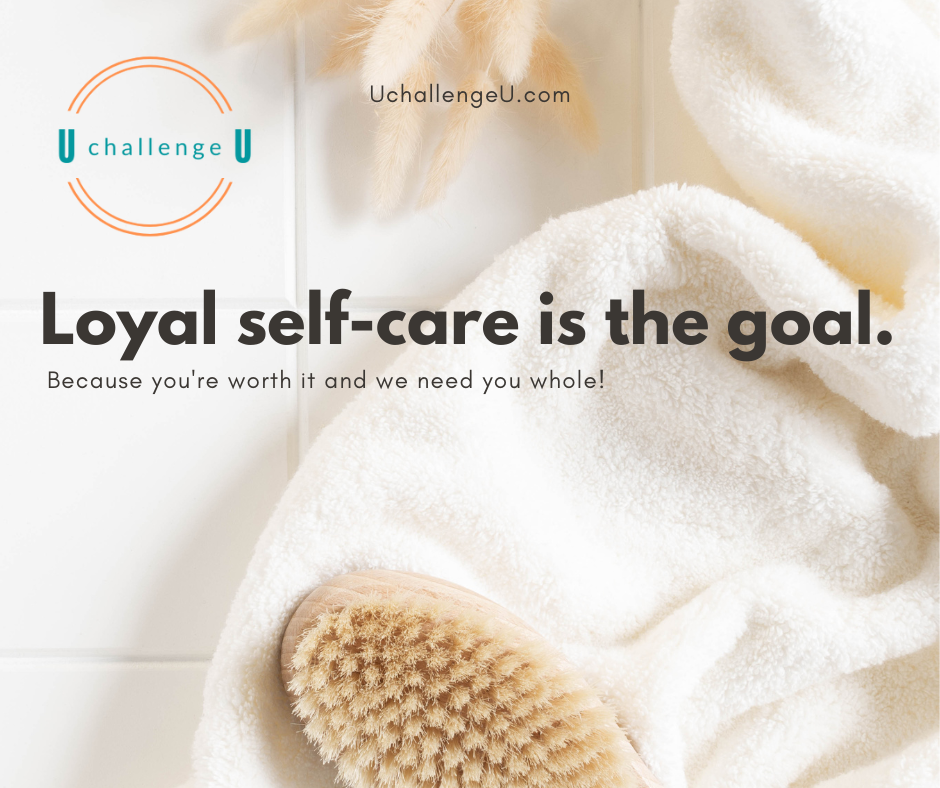The Power of Loyal Self-Care
- Asia

- Nov 6, 2022
- 4 min read

When you hear the term self-care, what comes to mind?
A scroll through my LinkedIn page is full of people taking a stand against stress and overwhelm by recommitting to self-care.
Their posts about self-care strategies often include activities like walking in nature, going on vacation and disconnecting from social media and tech devices.
Folks are establishing or reestablishing boundaries to improve work/life balance. They are replacing meetings with activities and projects that bring them joy.
The result leaves workers and caretakers feeling emotionally renewed, enabling them to show-up more present and engaged at work and at home.
I’m in favor of all of these strategies. Believe me, I'm all in. They all have their place and time.
Today, however, I want to talk about developing a Loyal Self-Care practice and distinguish it from a Fickle Self-Care practice.
What do I mean by developing a loyal self-care practice? It means to:
Consistently nourish your mind with compassionate, caring, and celebratory thoughts regardless of circumstances, particularly when experiencing difficult emotions.
To further clarify, here is what I mean by the terms compassionate, caring, and celebratory as it relates to ourselves. I’m focusing on ourselves as we’re already pros at showing up for others.
Compassionate (self-compassion) - speaking kind and comforting words to and about yourself mentally and/or verbally followed by self-supporting actions if needed.
Caring - Showing kindness, curiosity and concern for your well-being.
Celebratory- Finding joyful ways to acknowledge your wins, regardless of size and appreciate the good within and around you.
Fickle Self-Care is when we beat up on ourselves and don’t give ourselves the care we need when we’re feeling vulnerable and need tenderness.
For example when we are trying something new and we label ourselves as “failures” because our results don’t match our expectations. We beat ourselves up with our thoughts. No wonder we often shy away from challenging ourselves. We’re afraid of what we might do to ourselves mentally and emotionally.
When we practice fickle self-care, sometimes we show-up compassionately for ourselves and other times we don’t. Our love and support is conditional due to our lack of awareness of what we need. Instead, we look to others to get what we need for ourselves. Sometimes we can get what we need from others, sometimes we don’t.
You may even get the support and nurturing you want from others, but don’t accept it because you’re mired in your own stuff.
Why is loyal self-care critical to your well-being? When you practice loyal self-care…
You’re willing to work toward your dreams and goals without fear of suffering a beat down by your bully self. You already know what that feels like so no need to go into detail here. If your bully self does show up out of habit, it’s okay because your compassionate, loyal self will show-up and comfort your bully self, who is just scared and trying to protect you from harm.
You’re willing to take full responsibility for your feelings. You stop blaming others because you realize that despite what “they” do, you’re still in control of what you “think,” which influences how you feel and what you do in response.
You’re willing to have tough conversations because you know that you will be there for you regardless of how it goes. The key is to nurture and comfort yourself through challenges. Ultimately, you will need to decide how to do this for yourself.
You’re able to meet your own needs and it’s a respectful and uplifting way of relating to our mind, body, and spirit. Loyal self-care is healthier, more dependable, kinder and more compassionate than fickle self-care.
You comfort yourself beyond food and events such as taking baths, time off, vacationing, journaling and even meditating. While I encourage all of these activities, loyal self-care centers on the moments during and in between life’s daily activities.
So, be mindful of your self-talk when doing a task or simply relaxing on the couch. What thoughts are you thinking? Are you ruminating? A tell, tell sign is how you are feeling at any given moment.
Are you feeling inspired, motivated and empowered? If yes, then you’re thinking thoughts that are inspiring, motivating and empowering.
Feeling depleted, tired and frustrated? Then you are thinking thoughts that are making you feel depleted, tired and frustrated. Our thoughts create our feelings and our feelings are like smoke signals alerting us to pay attention to our thoughts.
Let me be clear. Becoming aware of your thoughts that do not align with what you want is not an opportunity to pounce on yourself. It’s an opportunity to wake-up to what you’re thinking so you can intentionally choose your thoughts if you desire.
Think of it this way. Our minds are like toddlers running around with adult scissors. Like toddlers, our minds need a constant, compassionate chaperone to guide us through the day until we’ve trained it to be compassionate, caring, and celebratory more frequently than not.
So how do you know when you are practicing Loyal Self-Care or Fickle Self-Care? I’ve listed a few characteristics of each type of care below.
Loyal Self-Care vs. Fickle Self-Care

Giving your self-care the royal treatment doesn’t have to take a huge investment of time or money. Though if it does, that’s fine too! It would most likely be worth the investment.
Adding the power of loyal self-care to your daily practices can give you the confidence to take more risks, learn new skills, and grow your emotional intelligence knowing that each moment is an opportunity for you to have your own back, no matter what.
Cheering you on,
Coach Asia




Comments